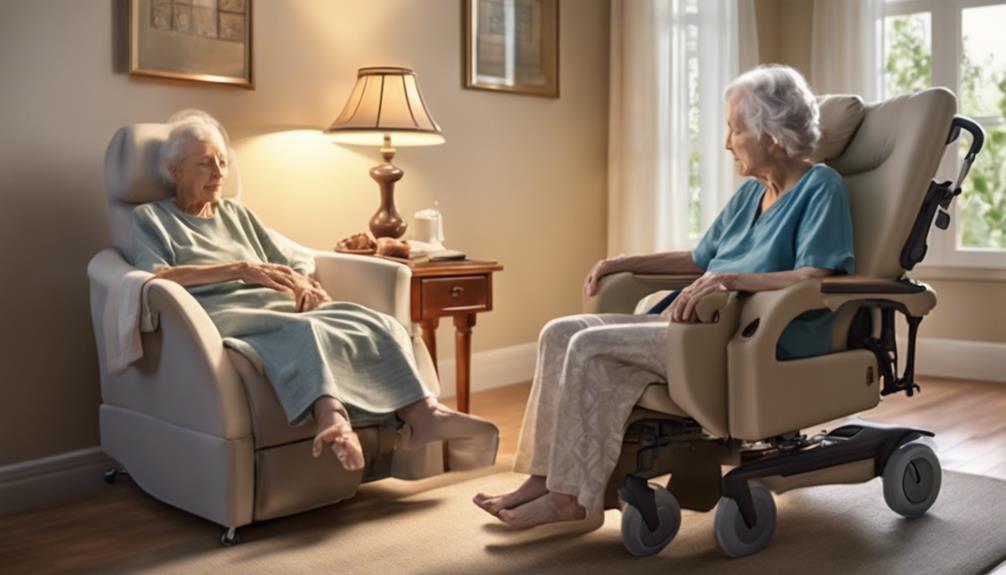Caring for patients with dementia at the end of their lives can seem daunting due to its complexity. Yet, exploring the intricacies of offering care during this time can offer valuable perspectives that may revolutionize your caregiving methods.
From navigating the unique challenges of advanced dementia to discovering innovative methods of enhancing quality of life, a deeper exploration into longevity insights might offer a new perspective on how to provide compassionate and effective care for those with dementia.
Key Takeaways
- Late-stage dementia challenges include weight loss and swallowing difficulties, requiring specialized care.
- Predicting life expectancy accurately for dementia patients becomes increasingly challenging as death approaches.
- Home-based care offers personalized support in a familiar environment, promoting comfort and security.
- Effective palliative and hospice care for dementia patients focus on enhancing quality of life and providing personalized support.
Understanding Dementia at End-of-Life
When facing the end-of-life stage with a loved one suffering from dementia, it's crucial to understand the unique challenges and complexities that come with this progressive brain disease. Late-stage dementia can be particularly challenging, as symptoms like weight loss, swallowing difficulties, and signs indicating approaching death can persist for months, making it hard to predict life expectancy accurately.
Providing care for dementia patients in their final days requires a deep level of compassion and patience. Family members play a crucial role in supporting dementia patients during this difficult time. Understanding the symptoms and progression of late-stage dementia is essential for offering the best possible care and comfort. Palliative care becomes increasingly important as the disease advances, focusing on symptom management and improving the quality of life for both the patient and their family.
In this phase, providing emotional support to both the patient and their family is paramount. It's essential to create a calm and reassuring environment, ensuring the patient feels safe and loved. Remember, your presence and understanding can bring immense comfort to those battling dementia at the end of their life.
Home-Based Care Perspectives

Considering the unique needs of dementia patients at the end of life, exploring home-based care perspectives can offer personalized and compassionate support for their comfort and well-being. Home-based care provides a familiar environment, reducing aggression and confusion while enhancing the quality of life through consistent and tailored assistance. However, it's essential to acknowledge that not all dementia patients can be cared for at home due to the intensive care needs and the caregiver's capacity. Providing end-of-life care at home demands a significant time and financial investment to ensure the patient's comfort and safety. For families willing and able to commit to this level of care, home-based care can be a feasible option that promotes a sense of familiarity and security for the patient. Below is a table highlighting key aspects of home-based care for dementia patients:
| Aspect | Description |
|---|---|
| Familiar Environment | Reduces confusion and enhances comfort |
| Financial Investment | Significant cost and time commitment required for proper care |
| Quality of Life | Personalized support improves the overall well-being of the patient |
Caring for End-Stage Dementia
To provide optimal care for individuals with end-stage dementia, it's crucial to understand the specialized support and considerations required during this challenging phase of the disease progression. Here are some key points to consider:
- Life Expectancy: End-stage dementia typically lasts 1 to 2 years, although this can vary among individuals.
- Palliative Care: Focuses on comfort, pain relief, and enhancing the quality of life for dementia patients nearing the end of life.
- Hospice Care: Provides end-of-life support when life expectancy is 6 months or less, ensuring comfort and pain relief either at home or in medical facilities.
- Alzheimer's: Patients with Alzheimer's disease, one of the most common forms of dementia, may live 8-10 years post-diagnosis on average.
- Support: Healthcare professionals, including palliative care and hospice experts, offer valuable insights and assistance for end-of-life care in dementia.
During this challenging time, ensuring comfort, dignity, and quality of life for individuals with end-stage dementia is paramount. By providing compassionate care and tailored support, you can make a significant difference in their final journey.
Better Palliative Care Workshop Summary

In a collaborative effort to enhance palliative care for individuals with dementia, a workshop in Cork, Ireland convened 49 experts from various academic and practice settings in May 2016.
The discussions at the interdisciplinary workshop focused on crucial aspects such as advance care planning, recognizing the personhood of individuals with dementia in end-of-life care, and strategies for providing care at home for advanced dementia patients. This gathering identified research priorities aimed at filling gaps in clinical research to improve palliative care services for people with dementia.
Emphasizing the significance of interdisciplinary collaboration, the workshop highlighted the need to strengthen care frameworks for individuals living with dementia. By coming together, these experts aimed to enhance the quality of end-of-life care provided to individuals with dementia, ensuring that their unique needs and preferences are respected and met with compassion and understanding.
Hospice Care for Alzheimer's Disease
Hospice care for Alzheimer's disease offers specialized support and comfort to individuals in the final stages of the illness, focusing on enhancing quality of life and providing personalized care tailored to their unique needs and preferences.
Key Points:
- Hospice care for Alzheimer's disease focuses on providing comfort, pain relief, and emotional support in the final stages of the disease.
- Individuals with advanced Alzheimer's may benefit from hospice services, which can be offered at home or in specialized facilities.
- Hospice care teams for Alzheimer's patients typically include nurses, doctors, social workers, and spiritual care providers.
- Hospice support for families of Alzheimer's patients includes caregiver training, 24/7 access to nurses, and emotional assistance during the end-of-life journey.
- Hospice care for Alzheimer's disease aims to enhance quality of life, ensure dignity, and provide personalized care tailored to the patient's needs and preferences.
In these challenging times, hospice care serves as a beacon of solace, ensuring that those with Alzheimer's disease receive the compassion and support they deserve.
Frequently Asked Questions
Which Are Appropriate Actions for the Nurse Providing End of Life Care for Patients With Dementia?
As you care for patients with dementia at the end of life, focus on ensuring comfort, managing symptoms, and providing emotional support. Regularly assess pain levels, hydration, and nutrition to enhance quality of life.
Facilitate communication between patients, families, and the healthcare team. Implement personalized care plans that prioritize dignity and autonomy. Collaborate with other healthcare professionals for holistic care.
Your compassionate approach will make a meaningful impact on those you serve.
What Is the Average Life Expectancy for Someone With Dementia?
On average, someone with dementia can live between 5 to 10 years post-diagnosis, depending on the type of dementia they've and individual factors. This unique journey can present challenges and opportunities for providing compassionate care tailored to their specific needs and wishes.
Understanding these variations in life expectancy can guide you in offering the best support and comfort during this difficult time. Your dedication and empathy make a significant difference in their quality of life.
What Are Close to Death Signs of Dementia?
As death nears for someone with dementia, you may notice increased confusion, decreased responsiveness, and changes in breathing patterns. These signs can persist for months, indicating the progression towards the end of life.
Other indicators may include rapid deterioration, loss of consciousness, decreased food intake, swallowing difficulties, irregular breathing patterns, limited speech, withdrawal, and loss of mobility. Being aware of these close to death signs can help you provide the best care and support during this challenging time.
How Do You Say Goodbye to Someone With Dementia?
Saying goodbye to someone with dementia involves expressing love, gratitude, and reassurance in familiar ways. Use touch, music, and comforting routines for effective non-verbal communication.
Create a calm environment to reduce anxiety and promote connection. Focus on emotional connection and shared experiences, not verbal responses.
Acknowledge the person's dignity and humanity throughout the process. Your compassion and understanding will help make farewells meaningful and comforting for both of you.
Conclusion
As you navigate providing end-of-life care for dementia patients, remember to prioritize their individual needs and wishes. By embracing effective communication, advance care planning, and cultural considerations, you can ensure the best possible support for your loved one.
Recognizing late-stage signs of approaching death is like finding a needle in a haystack, but with the right resources and support, you can navigate this challenging journey with compassion and empathy.
Stay strong and remember, you aren't alone in this.









